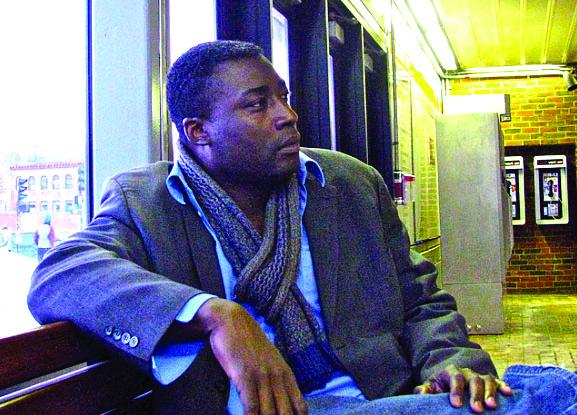September 24, 2020

Playwright/filmmaker John Oluwole Adekoje teaches film at BAA in Fields Corner.
An audio play written by John Oluwole Adekoje, a Boston-based playwright, filmmaker, and part-time faculty member at Boston Arts Academy, is among several plays released this week as part of the Huntington Theatre Company’s “Dream Boston” series.
The series, launched earlier this year, challenged playwrights to enact “a future vision of our city” set at a location special to the writer. Adekoje chose to set his play, “The Rainman,” on a stretch of Malcolm X Boulevard that he frequents. Against a “2024 dreamscape” backdrop, “The Rainman” grapples with an issue plaguing American society today.
“It’s about police brutality,” explained Adekoje, “but it’s set in a world where everything has completely changed— it’s kind of apocalyptic — and there’s this ex-police officer at the bus stop trying to get on a bus.”
The ex-cop is denied entry to the bus— a representation of moving on— and therefore needs the help of the Rainman, a young man he shot years ago, to come aboard.
“They have to have a conversation about what happened,” said Adekoje, calling the work “a complicated story about forgiveness and sacrifice and status.”
The play draws on elements of fantasy and science fiction to comment on a reality that often seems chaotic and dystopian, he added.
“It’s not fantastic in the sense of the Marvel world, it’s fantastic in the sense that it pulls you into a world you recognize but you don’t recognize. We are living in a world that’s kind of shaky right now, so a better way to describe it visually is to make it apocalyptic, but it’s the same world.”
Writing an audio play, as opposed to a film or stage play, called for a slightly different approach, said Adekoje.
“I just wrote it like film, then began to adjust to the radio. I didn’t want it to just be talking heads.” Adekoje said he wanted to conjure visuals for listeners through sonic sounds, which will hopefully help them see the visuals in their heads.
Sonic cues and sound effects, such as bus motors and rain noises, serve to help the listener “feel the whole world,” as Adekoje put it.
After the writing process, the recording process required a slightly different approach as well due to Covid precautions. Sanitized Zoom recorders were sent to each of the voice actors in the project, who then joined together online for a virtual table read.
Adekoje said the conversation at the crux of the play demonstrates a need for ongoing dialogue in order to address police brutality and other social ills.
“There’s a necessity for all groups to have communication with each other, no matter how bad things are. There’s got to be a way to work it out, and so this play provides that opportunity. It’s not just about the violence, but also after the violence. What happens? How do you begin to heal a community? And that’s what it’s focusing on...I think the takeaway is that racism is not acceptable, xenophobia is not acceptable, but when that happens we still have to find a way to heal ourselves. I hope the play does that.”
“The Rainman” is available for listening at huntingtontheatre.org as of Sept. 23.


